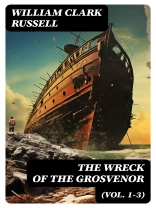In ‘The Wreck of the Grosvenor, ‘ William Clark Russell delivers a gripping maritime tale, rooted in the Victorian era’s fascination with the sea and shipwreck narratives. The novel unfolds across three volumes, blending rich, descriptive language with a dramatic plot that captures the harrowing experiences of the ship Grosvenor and its ill-fated journey. Russell’s expertise in nautical themes shines through, as he masterfully portrays the perils of ocean travel, the tumultuous forces of nature, and the intricate social dynamics aboard a ship. This work not only entertains but also reflects the historical context of maritime exploration and the era’s evolving understanding of maritime disasters, making it a significant contribution to nautical literature. William Clark Russell, an accomplished sailor and notable novelist, drew upon his extensive experiences at sea when crafting this narrative. His background uniquely equipped him to illuminate the lives of sailors and navigate the complexities of maritime conflict. Russell’s narratives often reflect his profound respect for the sea’s majesty and terror, capturing the reader’s imagination through his vivid storytelling and deep understanding of nautical life. Readers seeking an immersive, evocative exploration of the human spirit in the face of disaster will find ‘The Wreck of the Grosvenor’ both compelling and enlightening. A quintessential read for enthusiasts of maritime fiction and those interested in Victorian literature, this work promises a thrilling journey into the depths of both the ocean and the human soul.
Об авторе
William Clark Russell (1844-1911) was an English writer renowned for his nautical novels, which captivated readers with their vivid depictions of life at sea and thrilling maritime adventures. Born in New York City to English parents, Russell’s early experiences at sea—as a teenager he served on various ships—imbued him with firsthand knowledge that would later permeate his literary works. Often compared to the likes of Herman Melville, Russell’s writing stood out for its rich detail and authenticity, a testament to his seafaring days (Atkinson, 2004). His most acclaimed novel, ‘The Wreck of the Grosvenor’ (Vol. 1-3), first published in 1877, is considered a classic in the genre of sea stories. The novel skillfully charts the tale of mutiny and survival against the relentless forces of nature, showcasing Russell’s skill at crafting suspense and his deep understanding of maritime culture (Harding, 1999). Over the span of his career, Russell authored more than fifty books, solidifying his reputation as a master of maritime literature. His works not only provided thrilling narratives but also offered critical commentary on the seamen’s hardships and the maritime industry’s darker aspects, earning him recognition as a significant figure in the literary depiction of the sea (Maxwell, 2005).












